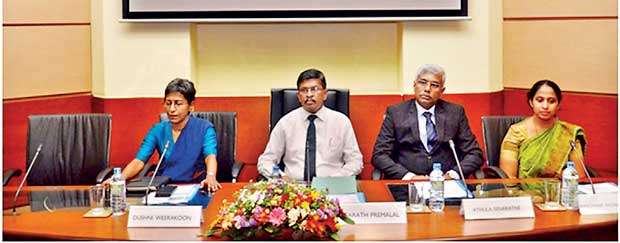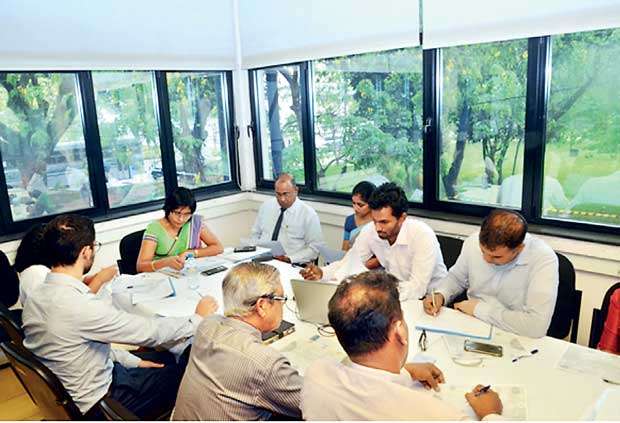Reply To:
Name - Reply Comment
Last Updated : 2024-04-20 13:31:00

From left: IPS Executive Director Dr. Dushni Weerakoon, Meteorology Department Director General Sarath Premalal, IPS Research Fellow Dr. Athula Senaratne and IPS Research Economist Kanchana Wickramasinghe
 Sri Lanka is being slapped with a number of significant challenges in its growth agenda and in that list, what it didn’t expect is to receive a blow from the impacts from climate change.
Sri Lanka is being slapped with a number of significant challenges in its growth agenda and in that list, what it didn’t expect is to receive a blow from the impacts from climate change.
While the implications of disasters stemming from climate change were realized late by the relevant authorities, it left hundreds and thousands displaced without any warning. Nevertheless, in the recent years, disasters, due to heavy rain, have been a repeated occurrence but actions or precautions taken to ensure minimal damage for livelihoods and infrastructure are observed to be inadequate.
The latest climate report released by Germanwatch stressed that countries such as Haiti, India, Sri Lanka and Vietnam, are repeatedly hit by extreme weather and have no time to fully recover. It notes that with the consequences being hardly bearable in smaller states, this alone highlights the importance of having to support such nations in climate change adaptation as well as in dealing with climate-induced loss and damage.
Status of SL on climate change
Currently, Sri Lanka ranks high on global indices for vulnerability to climate change and natural disasters where it stands at fourth position in the Global Climate Risk Index in 2018, with a score of 11.50.
Ranking first is Haiti, with a score of 2.33, followed by Zimbabwe, with 7.33 and Fiji, with a score of 10.17.
Global Climate Risk Index 2018 analyses to what extent countries have been affected by the impacts of weather-related loss events, such as storms, floods, heat waves and others. The index is an analysis based on one of the most reliable data sets available on the impacts of extreme weather events and associated socio-economic data.
Sri Lanka is observed to be facing climate changes of three types, the gradual increase in ambient air temperature, changes in the distribution pattern of rainfall and increase in frequency and severity of extreme weather events. The latest projections by the Meteorology Department of the Disaster Management Ministry indicate that by 2050, the dry zones will witness approximately 60 percent drop in rainfall, whereas in the hill country, rainfall is expected to double. According to economists, addressing the evolving issue demands complex policy interventions, which in turn calls for combined actions in the policymaking process.
Survival plan: Adaptation
While it is impossible to mitigate, Sri Lanka has opted for adaptation as a strategy to overcome the impacts of climate change. In this context, adaptation is defined as: ‘the behaviour in response to actual or expected variability or change in climate in order to moderate and cope with harmful impacts or to take advantage of the opportunities’.
It has been pointed out that a number of policy initiatives have been taken in this regard but a lot more needs to be done in reducing the socio-economic effects.
The Institute of Policy Studies (IPS) Environmental Economic Policy Unit has stressed that all major economic sectors of the country are vulnerable to impacts of these changes in the climate, though the nature and magnitude of the impacts may vary across sectors.
In an effort to take control of the recurring disasters, the government has formulated a National Adaptation Plan for Climate Change Impacts for Sri Lanka 2016 – 2025 (NAP). It is said to be one of the key policy steps, which is central for implementation of climate adaptation activities in many sectors at national level. The implementation of the NAP is already ongoing but it is highlighted that there are many areas that need further policy attention.

Working group
Lack of research
Comprehensive research-based inputs are said to be vital in this regard but it has not received due emphasis despite huge losses being caused from climate change.
According to IPS Executive Director Dushni Weerakoon, there is a considerable way to go in bringing climate change impacts to the centre stage to the government policy and policy foundation. Meanwhile, it was stressed that is much more to be done in addressing and strengthening the body of research literature of climate change when one look at its socio-economic impacts.
With scientists having cautioned that in the future the magnitude of losses and damages due to the slow-onset impacts may exceed the losses caused by the growing incidence of catastrophic disasters and in that context, making an informed effort to face this reality requires filling major gaps in the current system with respect to information, policy, institutions, technology and resource mobilization.
Gap in access to climate information
Efforts are being made to be better prepared towards events that stem from climate change but authorities are observed to be struggling in charting the way forward due to the availability of limited information/data.
Actions in key areas are imperative but access to the right information is fundamental to succeed in all areas, according to the IPS. Meanwhile, noted is a “huge gap” in climate information and the same needs to be bridged through appropriate types of climate information products (CIPs). For that, Sri Lanka has to take meaningful steps towards the development of reliable CIPs.
CIPs are of many types and include but not limited to short- to long-range weather forecasts, monthly to seasonal outlooks, long-term climate projections, early warnings, information packs such as agro-climatic calendars and customized weather information for shipping and aviation.
Policy gaps
Authorities have recognized five major gaps acting as policy challenges and have been listed as information, technology, policy, institutional and resource mobilization gaps. While all areas require immediate attention, it is the area of policy that requires greater emphasis. The primary reason being there is a considerably long-time gap existing between decisions and outcomes, the lack of proper information has led to ‘risky choices’.
A few issues in that regard include climate insurance not being considered as a risk management strategy. The lack of trust, education and awareness are said to be major barriers. While the common coping strategy is borrowing, economists note that climate insurance can complement other strategies.
Way forward
Adaptation has been recognized to be the strategy for recovering but key authorities, along with economists have suggested it is necessary to move from adaptation and into areas such as mitigation, loss and damage and climate finance as new areas of focus.
Alongside increasing rigor and focus on research studies, there is a need to improve policy orientation, create new collaborations and partnerships and eventually develop new knowledge product outputs.

Add comment
Comments will be edited (grammar, spelling and slang) and authorized at the discretion of Daily Mirror online. The website also has the right not to publish selected comments.
Reply To:
Name - Reply Comment
On March 26, a couple arriving from Thailand was arrested with 88 live animal
According to villagers from Naula-Moragolla out of 105 families 80 can afford
Is the situation in Sri Lanka so grim that locals harbour hope that they coul
A recent post on social media revealed that three purple-faced langurs near t